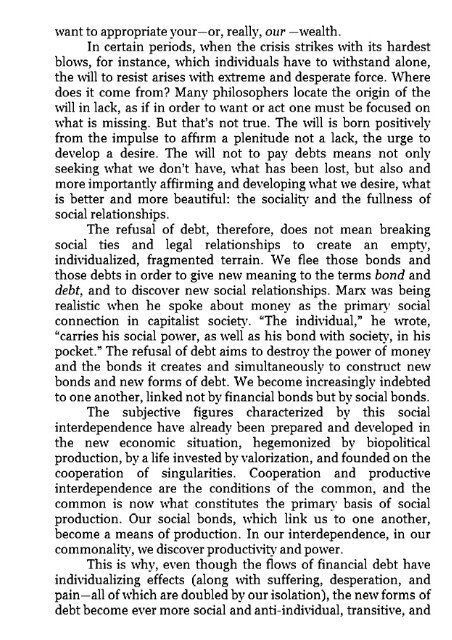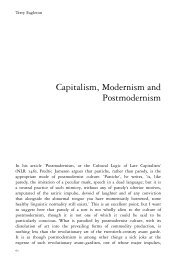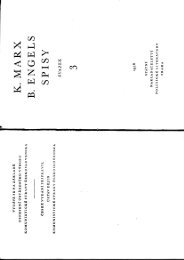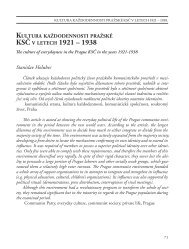Chapter 1: Subjective Figures of the Crisis ... - Negri in English
Chapter 1: Subjective Figures of the Crisis ... - Negri in English
Chapter 1: Subjective Figures of the Crisis ... - Negri in English
You also want an ePaper? Increase the reach of your titles
YUMPU automatically turns print PDFs into web optimized ePapers that Google loves.
want to appropriate your—or, really, our —wealth.<br />
In certa<strong>in</strong> periods, when <strong>the</strong> crisis strikes with its hardest<br />
blows, for <strong>in</strong>stance, which <strong>in</strong>dividuals have to withstand alone,<br />
<strong>the</strong> will to resist arises with extreme and desperate force. Where<br />
does it come from Many philosophers locate <strong>the</strong> orig<strong>in</strong> <strong>of</strong> <strong>the</strong><br />
will <strong>in</strong> lack, as if <strong>in</strong> order to w T ant or act one must be focused on<br />
w T hat is miss<strong>in</strong>g. But that's not true. The will is born positively<br />
from <strong>the</strong> impulse to affirm a plenitude not a lack, <strong>the</strong> urge to<br />
develop a desire. The will not to pay debts means not only<br />
seek<strong>in</strong>g w T hat we don't have, w T hat has been lost, but also and<br />
more importantly affirm<strong>in</strong>g and develop<strong>in</strong>g w T hat we desire, w T hat<br />
is better and more beautiful: <strong>the</strong> sociality and <strong>the</strong> fullness <strong>of</strong><br />
social relationships.<br />
The refusal <strong>of</strong> debt, <strong>the</strong>refore, does not mean break<strong>in</strong>g<br />
social ties and legal relationships to create an empty,<br />
<strong>in</strong>dividualized, fragmented terra<strong>in</strong>. We flee those bonds and<br />
those debts <strong>in</strong> order to give new mean<strong>in</strong>g to <strong>the</strong> terms bond and<br />
debt, and to discover new social relationships. Marx w T as be<strong>in</strong>g<br />
realistic w T hen he spoke about money as <strong>the</strong> primary' social<br />
connection <strong>in</strong> capitalist society. "The <strong>in</strong>dividual," he wrote,<br />
"carries his social pow T er, as w T ell as his bond with society, <strong>in</strong> his<br />
pocket." The refusal <strong>of</strong> debt aims to destroy <strong>the</strong> pow T er <strong>of</strong> money<br />
and <strong>the</strong> bonds it creates and simultaneously to construct new<br />
bonds and new forms <strong>of</strong> debt. We become <strong>in</strong>creas<strong>in</strong>gly <strong>in</strong>debted<br />
to one ano<strong>the</strong>r, l<strong>in</strong>ked not by f<strong>in</strong>ancial bonds but by social bonds.<br />
The subjective figures characterized by this social<br />
<strong>in</strong>terdependence have already been prepared and developed <strong>in</strong><br />
<strong>the</strong> new economic situation, hegemonized by biopolitical<br />
production, by a life <strong>in</strong>vested by valorization, and founded on <strong>the</strong><br />
cooperation <strong>of</strong> s<strong>in</strong>gularities. Cooperation and productive<br />
<strong>in</strong>terdependence are <strong>the</strong> conditions <strong>of</strong> <strong>the</strong> common, and <strong>the</strong><br />
common is now w T hat constitutes <strong>the</strong> primary' basis <strong>of</strong> social<br />
production. Our social bonds, w T hich l<strong>in</strong>k us to one ano<strong>the</strong>r,<br />
become a means <strong>of</strong> production. In our <strong>in</strong>terdependence, <strong>in</strong> our<br />
commonality, we discover productivity and pow T er.<br />
This is why, even though <strong>the</strong> flow T s <strong>of</strong> f<strong>in</strong>ancial debt have<br />
<strong>in</strong>dividualiz<strong>in</strong>g effects (along with suffer<strong>in</strong>g, desperation, and<br />
pa<strong>in</strong>—all <strong>of</strong> w T hich are doubled by our isolation), <strong>the</strong> new forms <strong>of</strong><br />
debt become ever more social and anti-<strong>in</strong>dividual, transitive, and










